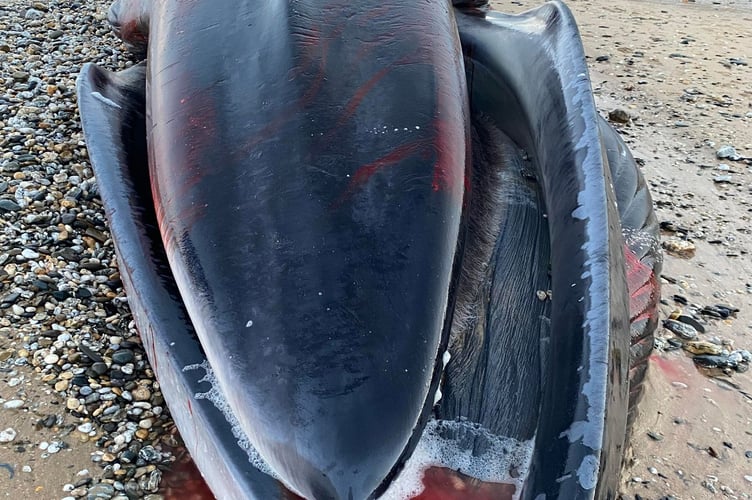A huge juvenile fin whale has washed up on South Fistral beach on Wednesday morning.
The 54ft Fin Whale, which is an endangered species, was previously spotted off the Cribbar on Tuesday behaving strangely as if it was ill.
Unconfirmed reports may suggest it stranded live.
The death is currently unexplained and a post-mortem is due to be carried out later today.
Early reports are that the young emaciated Fin Whale is emaciated and full of parasites
Newquay Coastguard Search and Rescue Team, Devon and Cornwall Police and The British Divers Marine Life Rescue (BDMLR) have put a cordon in place.
Advice given to the public is to stay over 20ft away as a dead marine animal is extremely hazardous.
There are organisms still living on the now deceased whale and the blood can be toxic.

A decision will be made concerning if the tide will naturally move the body or other measures will be required.
The fin whale is the second-longest species on Earth, after the blue whale, and are normally found in deep, offshore waters, primarily in temperate to polar latitudes.
There have been various rare sealife being spotted off the UK coastline over the past year.
Theories include sea warming, or a change in currents.

Newquay MP Steve Double said: "I have had an update from the Environment Agency.
"The Police and Cornwall Council are attending and are being advised by the Cornwall Wildlife Trust Marine Strandings Team. "Cornwall Council, as beach owner, are the lead authority for this incident.
"The Environment Agency remit is to provide waste management advice to Cornwall Council on the carcass removal process and to warn and inform on any risks to bathing water quality. "Bathing Water Quality (via the Pollution Incident Reporting Tool (PIRT)) warnings have been issued this morning for both North and South Fistral bathing waters and are expected to remain in place until November 17, once the operation of the carcass removal work has finished. "I hope they will be able to quickly take appropriate action to remove the whale as soon as possible." The largest fin whales are reportedly capable of growing to a length of 27.3 metres long, with a maximum confirmed length of 25.9 metres.
Described by American naturalist Roy Chapman Andrews as the 'greyhound of the sea' as it is able to swim faster than ocean going vessels, the fin whale is regarded as vulnerable on the conservation status by the International Union for Conservation of Nature (IUCN).
It was heavily hunted during the 20th century, leading to it being regarded as endangered.
The scale of loss is staggering; over 725,000 fin whales were reportedly taken from the Southern Hemisphere between 1905 and 1976 and by 1997, it is believed only 38,000 survived.
Despite a moratorium on commercial hunting issued by the International Whaling Commission, the species are still hunted by Iceland and Japan.
With a maximum recorded weight of 74 tonnes and a maximum estimated weight of 114 tonnes, the fin whales preferred food comprises of small schooling fish, squid and crustaceans including copepods and krill.
They are often seen in all major oceans from polar to tropical waters, with the exception of waters close to the pack ice at the poles and small areas of water away from the open ocean.




